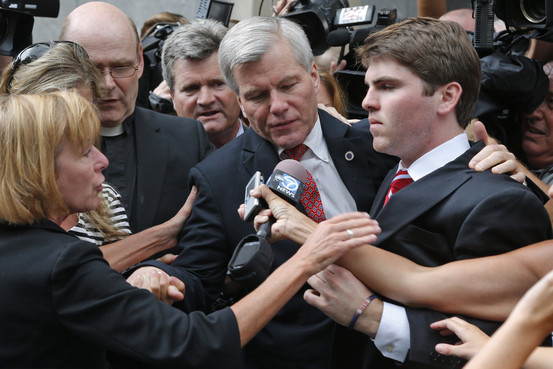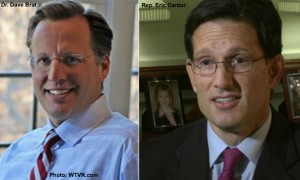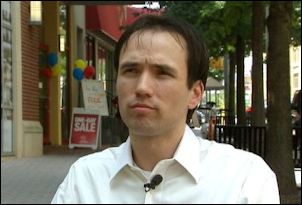
Michael Lind
by James A. Bacon
Have the Culture Wars peaked? Is the national debate over God, Gays and Guns on the downward slide? Michael Lind, a conservative thinker and cofounder of The New America Foundation, thinks the end is foreseeable. Just as the Civil War didn’t end after Gettysburg — the Confederate states still had a lot of fight left in them — the controversy over abortion, gay rights and gun rights will generate headlines for years to come. But there isn’t much doubt who will win the war.
Look at the views of the Millennial Generation and you can see which way popular sentiment is heading. Millennials are far less likely than their elders to say religion plays an important role in their lives, and they are more likely to define themselves as social liberals. They are less likely to own guns and more likely to support gun control. They are the only demographic cohort in which a majority — 70% — support gay marriage.
As liberal Millennials replace conservatives from the G.I. Generation and the Silent Generation, will political power swing decisively to the Democratic Party? Not necessarily, writes Lind in “The Coming Realignment,” an essay in The Breakthrough. But there will be a massive shift in the fissures dividing the nation. How that will play out in terms of partisan politics is difficult to predict but rest assured that the Republican Party, a coalition of disparate and often fractious groups, will reinvent itself.
Lind analyzes contemporary U.S. politics along two great dividing lines: economics (free markets, regulation, inequality of wealth) and culture (guns, God and gays). Democrats represent the economic and cultural liberals; Republicans represent the economic and cultural conservatives. But there are many economic liberals/social conservatives (often called populists) and economic conservatives/social liberals (often labeled Libertarians) who don’t fall easily in either camp. As the social conservatives are slowly eased out of the picture, Lind argues, political coalitions will reorganize around two new poles: Liberaltarians and Populiberals.
Liberaltarian, a term already in use, describes “a broad camp including neoliberal Democrats skeptical of government in the economic sphere along with libertarian Republicans and independents who recognize the need for more government than libertarian ideologues believe to be legitimate.”
Populiberal, Lind’s coinage, describes “social liberals who share the liberal social values of liberaltarians, but who tend to be more egalitarian and to favor a greater role for the government in matters like social insurance, business-labor relations, and redistribution of income.”
Lind then boldly suggests that these two new coalitions will align themselves geographically between “Densitarian” and “Posturbia.” By Densitaria, he refers to the higher-density urban precincts, both downtowns and suburban villages, where higher-income Americans increasingly prefer to reside along with the service class that caters to their needs. Posturbia is comprised of lower-density suburbs and rural areas where the working and middle classes live. Residents of Densitaria and Posturbia will tend to disagree about the nature of the social safety net (should it be tailored to the needs of the most vulnerable, or should it structured more like universal social insurance?), the tax structure (soak the rich?) and the nanny state (using government power to combat obesity).
Though fascinating, Lind’s argument is not entirely convincing. He is entirely correct that the national sentiment is becoming more liberal on some Culture War issues, most notably gay rights. But I don’t believe the needle has moved much on abortion. And, as medical science advances, I think we will see entirely new ethical dilemmas arise. It won’t be long before genetic engineering allows people to create “designer kids” or before the use of manufactured limbs, hearts and organs on the one hand and the rise of robots imbued with Artificial Intelligence raises questions of what it means to be human. It is not hard to predict a growing revulsion against what some deem to be progress. Some of that revulsion may be religion-based, but much of it could be secular.
One additional point: Millennials are culturally liberal now. But will they stay liberal when they get married, settle down and have kids? Look what happened to the Baby Boomers. Who would have thought in 1968 that a majority of the generation would wind up voting Republican in 2012?
Still, I think Lind is right about some things. The shift toward equal rights for gays is likely to be permanent and, within a decade, no longer will be controversial. I also think Lind is right that the last remnants of racial prejudice are dying out with the passing of the older generations. As young “people of color” see race as less and less of a factor affecting their lives, they will be less attached to the Democratic Party and more open to appeals by Republicans.
In my spare time, I am working on a novel set in 2075. I’ve spent a lot of time thinking what the United States will look like in 60 years. I’ve concluded that the world is so complex and the interactions of technology, economics, politics and culture so impossible to predict that the future is unknowable. With that caveat, I postulate the break-up of the Republican Party into two entities — the Enterprise Party (which is economically conservative and culturally liberal) and the Faith Nation (which is first and foremost culturally conservative). In my scenario, the Enterprise Party hives off some people who call themselves Democrats today, and the Democratic Party shifts so far to the populist-redistributionist left that it rebrands itself as the Social Democratic Party. (In my novel, the Social Democrats predominate. I guess you could call it a dystopia!)
Such idle speculation aside, America has seen dramatic political realignments before, and it will see them again. Lind makes a provocative case and he identifies key dynamics that will influence the outcome. Popular dissatisfaction with Americans political institutions is so intense today that it’s hard to believe that the current two-party duopoly can long continue in its current form. Lind’s essay is as good a place as any to start thinking about what comes next.
















